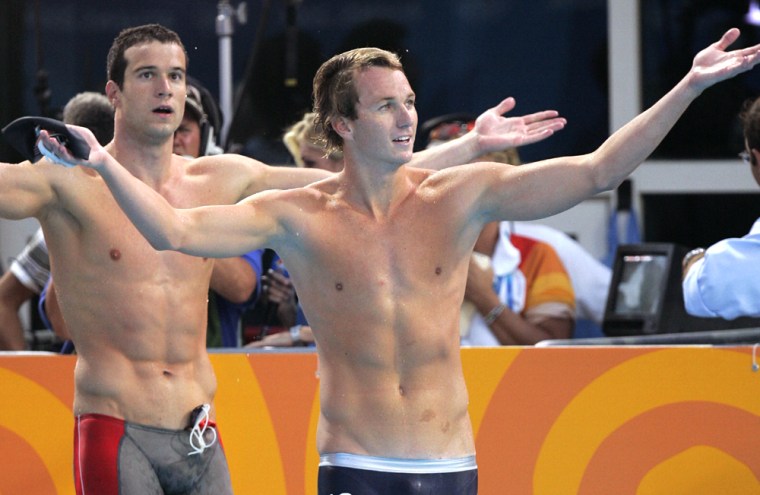The British Olympic Association is considering filing a protest of an American swimmer's gold medal-winning performance before an international arbitration panel, keeping alive a controversy that seemed to have ended Thursday night.
British swimming officials are pushing the BOA to bring the case to the Court of Arbitration for Sport, which has a temporary office here for the Olympic Games. The British are interested in upholding the disqualification of Aaron Peirsol in the 200-meter backstroke because one of their swimmers, James Goddard, would then move from fourth place to third, earning a bronze medal.
CAS Secretary General Matthieu Reeb said Friday that he has not yet heard from the British delegation. British swimming spokesman David Richards said the BOA was considering its next step.
Also Friday, members of the International Gymnastics Federation met to consider a protest lodged by South Korean officials over judging in the men's all-around competition Wednesday. American Paul Hamm won the gold medal by the narrowest margin in Olympic history, edging South Korea's Kim Dae Eun by 0.012 of a point.
Regardless of the outcome, Hamm will not be stripped of his all-around gold, the first by an American man in Olympic history, a FIG spokesman told the Associated Press.
The South Korean protest wasn't over Hamm's scores or those of Kim. It concerned the score that bronze-medal winner Yang Tae Young received on parallel bars. South Korean officials contended that judges credited Yang's routine with a 10.0 start value, the highest possible, during preliminaries and in team finals, but dropped it to 9.9 during the all-around competition. Had Yang been credited with the extra tenth of a point, his final score would have moved him ahead of Hamm for gold.
Under international gymnastics rules, a score can be changed only if a protest is lodged and found legitimate before athletes proceed to their next rotation. Because no objection was raised during Wednesday's competition, the scores cannot be changed. If FIG officials conclude that a judge erred, that judge may be sanctioned.
Brian Eaton, a spokesman for USA Gymnastics, said U.S. officials had received no notice of the review and would have no comment.
The judge who originally disqualified Peirsol -- a disqualification that was later overturned by swimming's international governing body, FINA -- stood by his call.
The controversy started after Peirsol won the 200-meter backstroke Thursday night by 2.4 seconds. But the judge in his lane, Denis Cadon of France, said Friday morning Peirsol had turned illegally at the 150-meter mark, his final turn. Cadon made the call immediately, and Peirsol saw a "DQ" on the board next to his name -- after he thought he won the gold.
FINA officials later said that Cadon didn't present proper technical evidence for a disqualification, and awarded Peirsol the gold medal, his second of the Games. Cadon, though, said he made the proper call.
"It's evident," Cadon said in an interview. "No problem [seeing the violation]. It was an infraction of the rule, and I make my judgment. I'm here for that. I'm independent."
Cadon would not comment on FINA's reasoning for overturning judgment.
U.S. men's coach Eddie Reese, who also coached Peirsol at the University of Texas, said he had looked at the replay of the race — and the turn in question — only briefly. He said he remained "comfortable" Peirsol had done nothing wrong.
Backstrokers are allowed to turn onto their stomachs as they head into the wall, but must make their turn in a continuous motion. Other American swimmers described Peirsol's turn as "long" and "tired," but said there wasn't a violation.
The British delegation is likely to have a decision on whether to move forward with a protest by sometime Saturday. Peirsol has one race remaining, the final of the 4x100 freestyle relay Saturday night, the last event of the meet.
Former U.S. gold medal winner Rowdy Gaines, who is serving as a commentator for NBC's Olympics coverage, said he reviewed the tape of the turn, and though the turn was slow, it wasn't illegal. He compared it to calling "a ticky-tack foul at the end of an NBA game."
"It's definitely the strangest thing I've ever seen in the sport," Gaines said, "as far as bizarre, surreal, whatever word you want to use."
